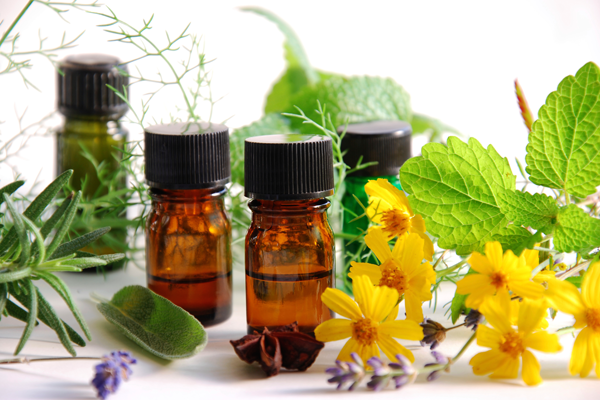Aromatherapy
Aromatherapy is a technique in which essential oils from plants are used with the intention of preventing or treating illness, reducing stress or enhancing well-being. Fragrance oils and products containing man-made compounds are not used in the practice of genuine aromatherapy. Although many gift shops sell scented candles, pomanders and potpourri as “aromatherapy,” genuine aromatherapy treatments use higher strength (concentrated) essential oils drawn from various herbs.
There are more than 100 essential oils commonly used for aromatherapy. These oils are extracted from flowers (rose, narcissus), roots (orris), leaves and needles (pine), resins (turpentine), seeds (caraway), fruits (lemon, lime), berries (cloves), bark (cinnamon) and wood (cedar). Many are obtained from familiar herbs and spices (basil, anise, nutmeg, cumin, oregano), and many are derived from substances related to herbal medicine (ginger, garlic, St. John’s wort).
How does aromatherapy work?
Certain scents can make us feel better—for example they can make us feel sleepy, relaxed or alert. At CHOC, aromatherapy is offered among our integrative health services. Our licensed traditional Chinese medicine practitioner performs aromatherapy in private patient rooms to help patients and their families feel better. We use essential oils that have been approved for safety and are a standard of care. Different oils are selected for specific symptom management, including:
- Pain: lavender, sweet orange, peppermint
- Insomnia: sweet orange, lavender
- Worries/Anxiety: lavender, sweet orange
- Fatigue: lemon, peppermint.
The oils are dripped lightly onto a cotton ball for a patient to hold to his or her nose. The scents also disperse into the air and benefit a patient’s family if they are in the room. Evidence suggests that when a person breathes in fragrant air, the odor-sensing nerves in the nose are stimulated, sending impulses to the limbic system of the brain.
Can I practice aromatherapy at home with my child?
You may wish to consult with a clinician who specializes in aromatherapy. However, you don’t have to meet with an aromatherapy specialist or use essential oils in order to enjoy the benefits of scent on your own feelings of well-being. Consider natural ways to use specific smells to help you feel better and experience the benefits of these commonly used aromatherapy scents. For example:
- A fresh lemon or orange
- A sprig of spearmint
- A few stems of lavender
- Any other item that produces a smell you enjoy and find helpful.
Everyone is different and each person may find a different scent that works best for them. Try a few different smells in order to see what works best for you.
How can aromatherapy help my child?
The idea of aromatherapy is that smelling essential oils activates the part of the brain connected to smell—the olfactory system. Then it sends a signal to the part of the brain that controls emotions and connects to memories (limbic system). This causes chemicals to be released which make the person feel relaxed, calm or stimulated. Many patients and their families have found aromatherapy to be helpful. Scientific research has also shown some benefits and more research is underway to better understand the possible benefits.
Are there any risks associated with aromatherapy?
Aromatherapy is considered quite safe when the essential oils are properly diluted by a trained professional. Using aromatherapy by smelling the essential oil has no known side effects. It is important to always use as instructed. Concentrated essential oils may be poisonous if swallowed and should be handled with care. Don’t ever drink an essential oil. We recommend only using aromatherapy with children who are at least 6 years old.
